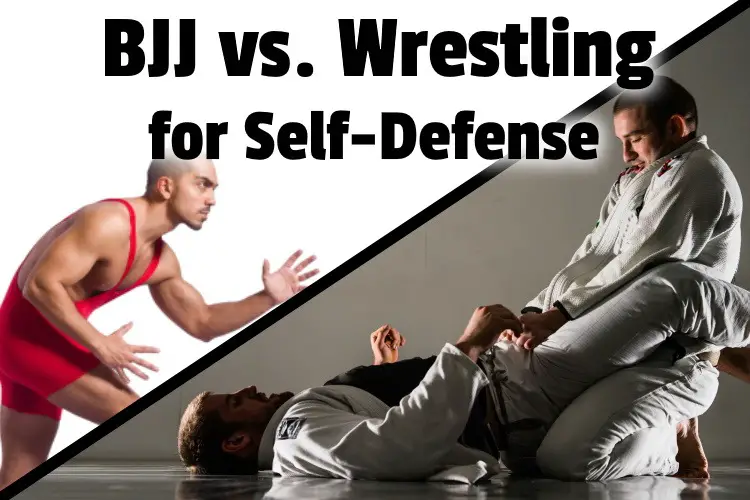Many people know that Brazilian Jiu-Jitsu is mostly grappling and groundwork that bears a strong resemblance to wrestling. However, there are some big differences between regular wrestling and BJJ, leaving many to wonder about the differences between BJJ vs. wrestling for self-defense.
BJJ is overall better than wrestling for self-defense due to its ability to work for smaller and lighter people against a larger opponent. While wrestling is a combat sport, it is often just as much about entertainment as it is about truly submitting an opponent.
BJJ is more about brains than brawn, and it equips you with the ability to defend yourself from almost any position.
Having said that, I believe that both complement each other. After all, they’re both essentially forms of grappling.
But bear in mind while I have trained with a teacher who had been a wrestler, most of my experience is with BJJ, so I admit some bias. In this article, we’ll check out BJJ vs. Wrestling and why BJJ is the way to go (if you had to choose).
Read on to discover more.
These giants are gonna be fun to watch. Could be fun to see standup or on the ground… Wrestling vs BJJ. pic.twitter.com/HHY3bMGWbl
— Mark Murray (@MarkTheMurray) September 4, 2015
Is wrestling good for self-defense?
Wrestling works well for self-defense. It equips practitioners with the skills to take down and pin opponents before applying a submission. It also helps build body mass, core strength, and flexibility, all of which can be useful if attacked.
Taking people down can be highly dangerous if they are not trained in how to break their fall. There are many points to show that wrestling is good for self-defense, but I’ll focus on two.
One of the expressions that smart wrestlers are hip to is “the ground hits harder than any punch.”
The reality is that most people you’ll meet aren’t trained to break a fall effectively. Imagine how painful it felt on occasions you’ve tripped! Maybe you were deep in thought, or there was an obstacle or a new hole on a path you know like the back of your hands.
Now, imagine how more devastating it is if you were to fight with someone flexible, strong, and quick and who’s been trained for years to take people down.
They could do immense damage in a fight by dodging or absorbing their opponent’s punches. And then successfully grab them, lift them up and throw them to the ground by hitting their back or head on a sharp object!
Even if they’re merciful and put you down gently on your back (unless you’re trained), you’re greatly disadvantaged once you’re on your back. Psychologically you’re close to giving up, and you can’t exert as much kinetic energy compared to if you were standing up.
Apart from taking you to the ground, most wrestlers have highly-conditioned bodies. They’re strong. Fighting someone stronger is likely to end badly.
Even a simple grip might become something akin to a handcuff.

Can wrestling beat BJJ?
A skilled BJJ practitioner can beat a comparably skilled wrestler. While both know grappling, takedown, and submission movements, a BJJ practitioner is also skilled in fighting techniques and likely to know a wider variety of finishes, even if the wrestler is larger and stronger.
Finishes? What do I mean?
Most wrestlers are sportsmen trained to operate within the framework of some rules.
That’s probably what will limit them in a street fight with a BJJ dude who knows how to finish a fight without using brute force, as a wrestler is most likely to do.
In wrestling, the goal is not submission. You pin your opponent.
In BJJ, the idea is to submit the opponent, so BJJ is more lethal. An armbar, a choke, a triangle, or even a simple wrist control can be applied to finish off the wrestler.
Wrestlers associate being on the ground and on their back with defeat, while the BJJ dude can “ground and pound.” They are trained to fight from every position; even while on their backs, they can do immense damage.
What if a contest between a BJJ fighter and someone who knows Judo?
It’s an interesting question, given Judo is an offshoot of Jiu-Jitsu. Check out a recent article of mine where I shared reasons why BJJ is better than Judo.
One of the reasons has to do with the fact that Judo is a sport, while BJJ is a defense system that trains you to tap out bigger and stronger opponents. It’s more “technical” than Judo.
Just click the link to read the article on my site.
What is the difference between wrestling and BJJ?
Wrestling differs from BJJ because the primary goal of wrestlers is to pin their opponent, whereas a BJJ practitioner will use a variety of joint locks and chokes to make an opponent submit. Also, some forms of wrestling are geared more for entertainment than true competition.
But let’s look at some of the key differences in greater detail:
Winning
Wrestling is a form of grappling where you win when you’re able to take down your opponent and pin them to the ground with you on top. In BJJ, on the other hand, you win when you’ve been able to submit your opponent. That’s to get them to give up. This is done when they tap on the mat.
Being on one’s back in wrestling is close to losing if one doesn’t wriggle out of it as fast as possible. In BJJ, you can still do immense damage. In fact, you can learn how to kill even while you’re on your back. We could say in wrestling, the focus is on takedowns, while control is the focus in BJJ.
Origin
Wrestling dates back centuries, while BJJ is a modern Brazillian adaptation of an ancient Japanese martial art.
Wrestling is a universal sport that is also used for self-defense. It’s present in most cultures, and as I explained above, you win when you’ve got your opponent’s back on the ground. BJJ was invented to help small folks beat bigger, stronger opponents.
Ranking
Wrestling has no belt system; BJJ does. In wrestling, the more wins, the better the wrestler.
In BJJ, there’s an official system of ranking that’s progressive. One cannot move to a higher stage until they’ve grasped what’s to be learned at a lower level. And, the different colors of belts won by practitioners show their level of mastery.
Brazilian jiu jitsu BJJ News. Always have fun training Jiu Jitsu martial arts. https://t.co/gz9P1pr8Mq#BJJ #brazilianjiujitsu #jiujitsu #bjjlifestyle #martialarts #MMA #UFC #JiuJitsu #bjjkids #bjjgirl #bjjstyle #bjjfamily #bjjproblems #bjjwomen #grappling #bjjmotivation pic.twitter.com/2XnSr5JhYX
— jiujitsu news (@NewsJiujitsu) January 22, 2021
Does wrestling have submissions?
Most styles of wrestling do not utilize submissions such as joint locks or chokes. In fact, it is illegal to submit your opponent in most wrestling contests.
As I explained earlier, you’re a winner when you’re able to take down your opponent such that they’re lying on their backs with their shoulders touching the mat for about two seconds.
Submissions in BJJ, however, could take a variety of forms.
Some could be incredibly painful, and some could simply kill an opponent or make them unconscious for a while. You see why they’re illegal in wrestling and why I said to choose BJJ if self-defense is what’s on your mind.
There are a few styles of wrestling where submissions are allowed. Sambo is an example. BJJ is another.
What? Yes, technically, BJJ is a blend of wrestling and Jiu-Jitsu. To make matters clear, the term submission wrestling is often used for forms of wrestling where submissions are allowed (not illegal).
You’ve probably heard that Aikido is one of those awesome martial arts where size or height don’t matter much.
And you’re wondering which is better: Aikido or BJJ? Check out a recent article of mine where I explained why you shouldn’t choose Aikido if self-defense is the focus.
Just click the link to read it on my site.
Working through Tuesday evenings wrestling pics and had this great sequence of @GuilloryLl slam! @South_Wrestling pic.twitter.com/ANP5u9ADGT
— M4 Photography (@M4Photography_) January 28, 2021
Which martial art is best for self-defense?
Krav Maga is the best martial art for self-defense because the goal is to destroy the assailant before they destroy you and to do so as quickly as possible by any means necessary while having as little damage as possible done to you.
Having said that, Krav Maga (KM) practitioners don’t go around looking for fights. But actually, that’s true of all skilled martial artists in all arts who have a brain.
They know that most times, it’s smart to avoid situations that could lead to fights. But when you can’t avoid the fight or flee from the scene, KM can protect you.
Krav Maga is lethal, so it’s effective in real life or a street fight.
In fact, it was originally developed to help Jews protect themselves against anti-Semites who physically attack them, and it’s used to train many military forces.
Don’t get me wrong. BJJ is lethal. It’s super-effective, and it is personally what I like the best. But, for someone in a rough neighborhood who needs crucial self-defense skills, KM is probably the better choice.
It’s full of “techniques” you’d actually need in a real fight.
It’s focused on results: incapacitating the opponent as soon as possible. This entails striking at their weak points. Granted, it lacks the graceful, dancelike movements we often associate with most martial arts.
To give you an idea of its effectiveness, some of the top techniques include:
- Kicking someone in the groin
- Dislocating an arm
- Breaking their nose
- Striking the throat
- Head butts
- Eye gouging
You’ll agree these “techniques” are deadly, right?
In a dangerous street fight, where one’s like is at stake, the above-mentioned “techniques” can be life-saving. You’re also taught how to use weapons such as knives, swords, and guns. And how to use everyday objects in your environment as weapons.
You’re also trained on how to defend yourself while you attack. And on how to shake off hits from the opponent. KM equips practitioners with life-saving skills. It’s super-effective.
Conclusion
Wrestling and BJJ are both forms of grappling.
In this article, we looked at how they differ, whether a wrestler can beat a BJJ fighter, and if submissions are allowed in wrestling.
We also looked at if wrestling is good for self-defense and which martial art is the best. We saw that Jiu-Jitsu is a better choice.
